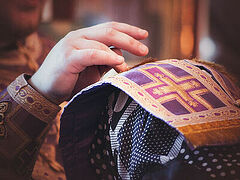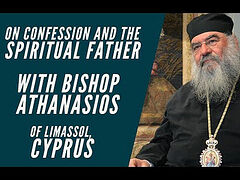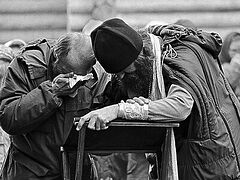In connection with Memorial (Ancestors’) Saturday, I would like to say a few words on our confession and repentance, since this is directly related to our eternal destiny. There is still time for us to repent.
The Lord in His earthly sermon calls to us: Repent: for the Kingdom of Heaven is at hand (Mt. 4:17). That is, repentance for a sinner is a prerequisite for entering the Kingdom; at confession a person stands before the reality of his life in the Kingdom of God.
Christ suggests that we only ask for forgiveness and try to improve. Repentance destroys hell in the penitent’s soul and transfers him to Paradise. There is no sin from which a person cannot be freed through repentance and confession. At confession the soul is, as it were, immersed in the “font of God’s mercy.” But how often do we walk away from this sacrament unforgiven because we do not always ask for forgiveness! We leave the source of healing unhealed.
We priests rarely hear at confession, “Lord, forgive me for this and that! I have grieved Thee…” Some come to confession to talk with a priest, even if on spiritual matters; others come simply because they want to be allowed to receive Communion; others to complain about their lives. But let’s not forget to use the gift, the opportunities that are given to us in this sacrament.
One of the Holy Fathers gives us the following image of repentance: the frost of sin has bound our hands, and we cannot insert the key into the keyhole of the door to the Kingdom of Heaven and turn it. We ask God and He unlocks it to us. We have to ask if we want to enter.
“Behold, child, Christ stands invisibly, accepting your confession,” we hear in the prayer before confession. In this sacrament, three stand at the analogion: the penitent, the priest and God. We often forget that God is standing here, accepting our confession, our repentance, and granting us forgiveness and healing in return. God is here at confession.
We can remember God when we realize that we have sinned, and we ask His forgiveness. We can also remember God when we prepare for confession, recalling and writing out our sins. And maybe we remember God when we read the preparatory prayers before Communion. Then we remember Him and may ask His forgiveness. But at confession, where He “stands invisibly, accepting our confession,” we often forget about Him.
It is hard to imagine that He is here, among the constant tumult, “battles” for a place in the queue, meetings and talks with friends, irritation at those standing around, among the condemnations and gossip of “convicts” like us, among us who have come to the “judgment”, but are not worrying about its “decision” and “verdict”. We do not often ask forgiveness for these sins committed immediately before confession: for ignoring God, for not believing that God is here in His church.
Does the Church tell us the truth that “Christ stands invisibly, accepting our confessions”? Does He really stand before the analogion? More often we priests hear “father”, “batiushka”, and only occasionally, “Lord Jesus Christ, forgive me!”
St. John Climacus writes: “During prayer and supplication stand with trembling like a convict standing before a judge, so that both by your outward appearance as well as by your inner disposition you may extinguish the wrath of the just Judge; for He will not despise a widow soul standing before Him burdened with sorrow and wearying the Unwearying One” (Ladder: 7: 11).1 So, we should stand at confession “burdened with sorrow”, as true penitents, as those who have grieved our God, as those who love Him, if we really love.
Confession, like prayer, is a conversation of the soul above all with God. And the priest is a witness and the mouth of God, absolving us from sins by prayer.
Let us not be like the Pharisees, who did not see God in God, but like sinners, tax collectors and harlots, who followed on His heels, heeded His words and fell at His feet. Let’s remember that The Lord is in His holy Temple (Ps. 10:4). Let’s not anger Him with our forgetfulness. Let’s remember that there are always three at confession: God, me and the priest. In advance, at least while in the queue, let’s prepare for this meeting at the confession stand.
And if we sin, then to the call of God, Where art thou? (Gen. 3:9), let’s answer: “I am here, O Lord! Forgive me, for I have sinned against Thee!” Amen.






